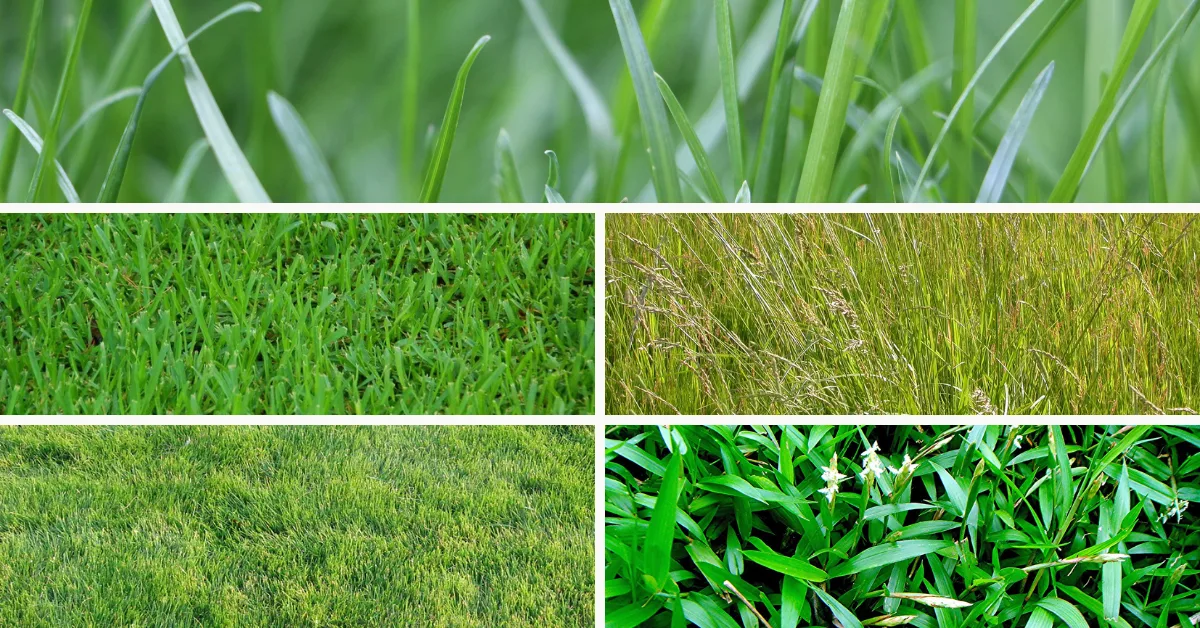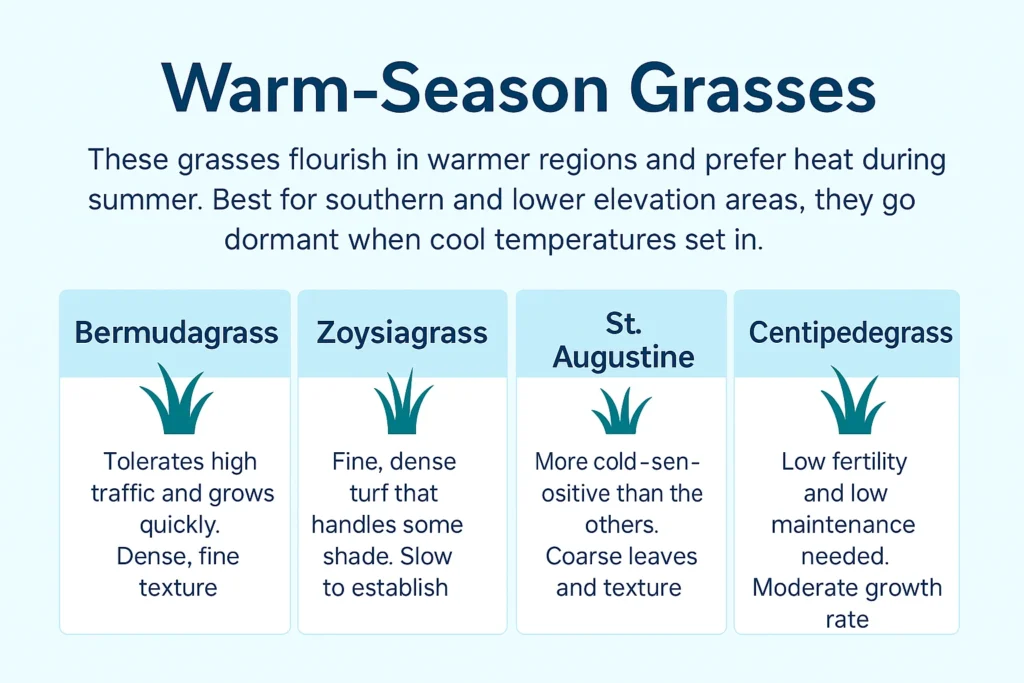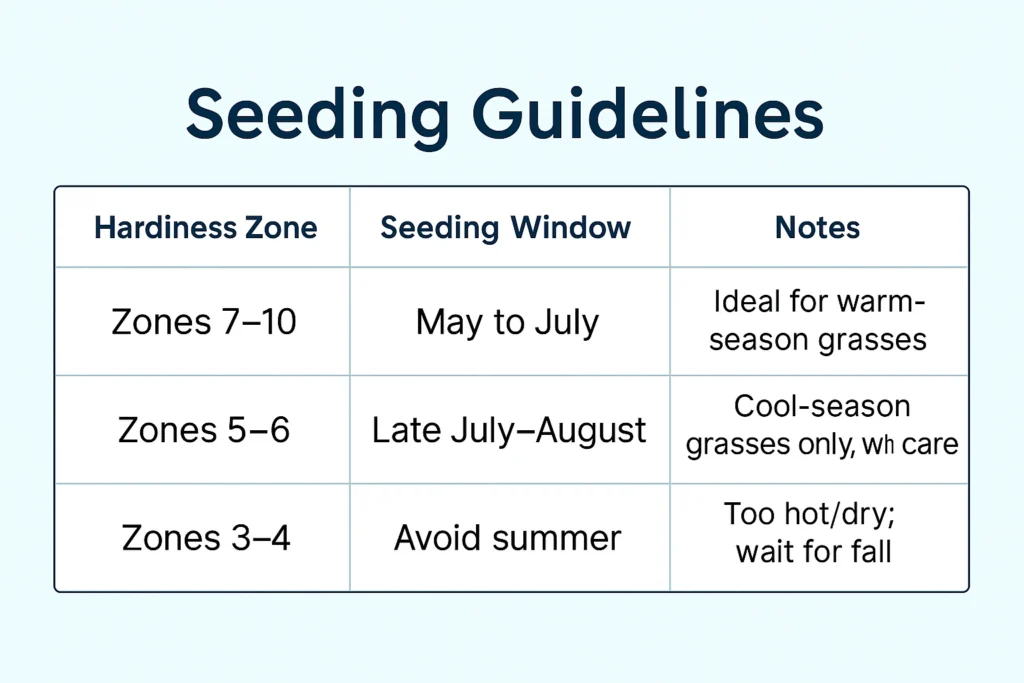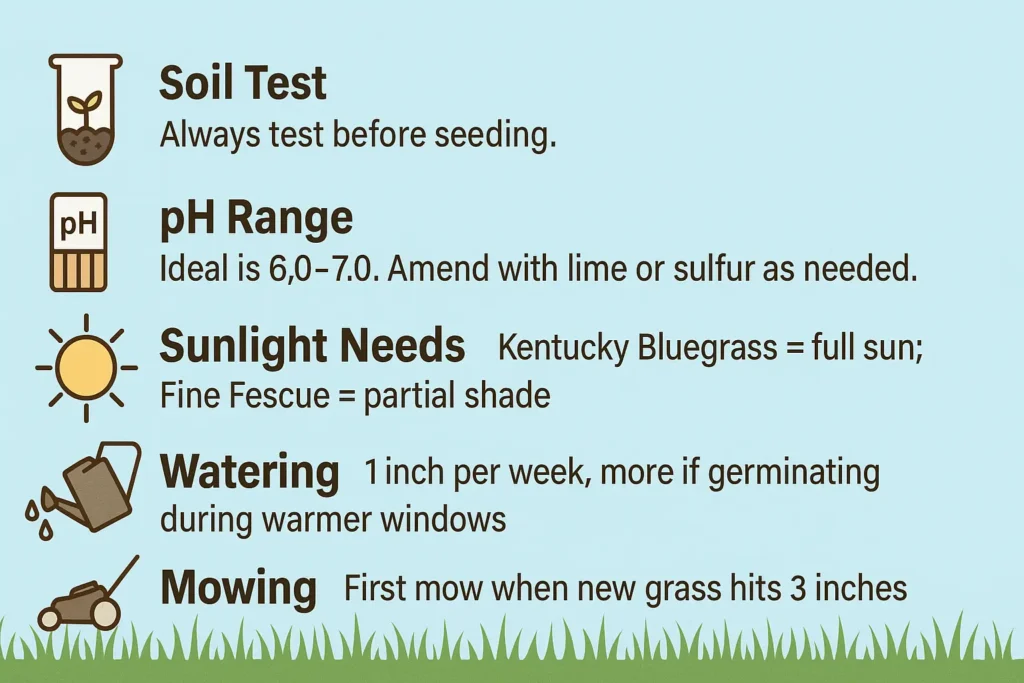When to Plant Grass Seed in Summer: Timing Tips by Region & Grass Type

Not everyone agrees on the best time to start a lawn, but sometimes summer is your only window. If you’ve missed the spring or want a fresh start before fall, you might be asking: when to plant grass seed in summer without wasting time or seed. The good news? It’s possible—with the right timing, seed choice, and prep.
In this guide, we’ll break down what happens when you seed in the heat, which grass varieties can handle it, how your hardiness zone plays into the timing, and specific tips by region. We’ll also share what to avoid so you don’t end up reseeding again in six weeks.
Understanding Summer Planting
Planting grass seed in summer is possible, but it comes with less room for error. Summer heat means higher evaporation, quicker soil drying, and more stress on seedlings. But if you’re planting warm-season grasses, or in a climate with moderate summers, you’re still on solid ground.
Cool-season grasses like Kentucky Bluegrass, Perennial Ryegrass, or Tall Fescue typically prefer early spring or fall. If you try seeding them in July, expect to baby them with extra water and protection from harsh sun. For cool-season grasses like fescue or rye, spring planting is often the safest choice.
Warm-season grasses, on the other hand, thrive in heat. Bermudagrass, Zoysiagrass, and Centipedegrass actually prefer to be seeded when soil temperatures are high—between 65°F and 70°F at a minimum, and often higher for best results.
So, if you’re wondering when to plant grass seed in summer and have a warm-season lawn, you’re likely in a good window.
Grass Types That Can Be Planted in Summer
Bermudagrass
Bermudagrass is one of the most heat-tolerant grasses, making it a top pick for southern lawns. It’s fast-growing, dense, and loves full sun. When planted in summer, it establishes quickly with warm soil and ample watering.
Zoysiagrass
Zoysiagrass grows more slowly but forms a thick, carpet-like lawn that tolerates traffic and sun. It does best with summer planting in warmer zones where soil doesn’t cool off too soon in early fall.
Centipedegrass
Centipedegrass is a low-maintenance, slow-growing grass often used in southeastern states. Summer planting gives it enough warmth to germinate, but be cautious of late-season drought stress.
Tall Fescue (Use with Caution)
Though a cool-season grass, Tall Fescue has deep roots and decent heat tolerance. If you must seed it in summer, wait until late summer (early August in northern zones), and be ready to water consistently.
Knowing when to plant grass seed in summer also means understanding which of these grasses works for your region and soil conditions.
How Hardiness Zones Affect Summer Seeding?
Your USDA hardiness zone determines how long your warm season lasts—and how much heat your young grass will endure. Knowing your zone helps answer when to plant grass seed in summer more accurately.
🔍 Not sure what zone you’re in? You can look up your zone here.
Best Regions to Plant Grass Seed in Summer
Summer planting success depends not just on grass type, but on your region’s weather patterns. Here’s how it breaks down.
Southern States like Georgia, Florida, and Texas are perfect for summer seeding with warm-season varieties. Use irrigation to beat drought stress.
Midwest States (Ohio, Illinois) require careful timing. Late summer is best, with Tall Fescue or Perennial Ryegrass.
Western States like California and Colorado need attention to local microclimates. In higher elevations or dry zones, use seed blankets or mulch to reduce evaporation.
Tips for Planting Grass Seed in Summer
Choose the Right Seed
Always match your seed to your zone and sun exposure. Fast-growing isn’t always better if it stresses easily in heat.
Prepare the Soil Thoroughly
Till lightly, remove debris, and rake for even contact. Water the soil 24 hours before seeding.
Water Deep, Not Daily
After seeding, water lightly 2–3 times a day to keep the top inch moist. Once germinated, reduce to deeper, less frequent watering.
Mulch with Straw or Cover
Use clean straw or a seed blanket to hold in moisture and protect from birds.
Time Your Fertilizer
Don’t fertilize the day you seed. Wait until germination, then use a starter fertilizer if needed.
Without proper prep, knowing when to plant grass seed in Summer won’t be enough. Soil and water are equally critical.
Check out our full regional seeding guide: Best Time to Plant Grass Seed (Guide)
Mistakes to Avoid
- Seeding in peak heat hours – Always seed in early morning or late afternoon.
- Overwatering or puddling – Moist doesn’t mean soggy.
- Ignoring seed label instructions – Different grasses have different needs.
- Skipping seed protection – Straw or mulch helps keep temperatures stable.
- Not knowing your zone – Timing changes drastically by region.
The window for when to plant grass seed in summer is narrow—missing it can set your lawn back a whole season.
What to Do If You Miss the Summer Window?
If you’re reading this late in the season, fall is often the best time to try again—especially for cool-season grasses. You can also consider:
- Dormant seeding in late fall
- Sod installation if you need immediate coverage
- Cover crops or groundcovers to prevent erosion until spring
Refer to Other Resources on Our Website
Need help selecting the right seed or calculating how much you’ll need?
- ✅ Grass Seed Calculator
- ✅ Lawn Fertilizer Calculator – Apply the right amount of nutrients based on lawn size and grass type
- ✅ Lawn Mowing Cost Calculator – Estimate mowing expenses by lawn size, frequency, and contractor pricing
- ✅ Lawn Care Cost Calculator – Budget for overseeding, watering, fertilizing, and more
These tools work together to help you make informed planting decisions based on your location and season.
Related State-by-State Grass Seeding Guides
Looking for more location-specific information?
- When to Plant Grass Seed in Michigan – Cool-season turf thrives in late summer to early fall
- When to Plant Grass Seed in Pennsylvania – Spring or fall planting depending on your zone
- When to Plant Grass Seed in Colorado – Tackle variable weather and dry conditions with timing tips
- When to Plant Grass Seed in Texas – Learn the best times for Bermuda, Zoysia, and more
- When to Plant Grass Seed in Ohio – Best practices for cool-season grasses in Midwest climates
- When to Plant Grass Seed in Illinois – Avoid windburn and frost with season-specific tips
- When to Plant Grass Seed in Georgia – Focus on warm-season varieties and irrigation timing
- When to Plant Grass Seed in Florida – Seeding around tropical rain patterns and heat
- When to Plant Grass Seed in California – Different zones mean different seeding calendars
- When to Plant Grass Seed in North Carolina – Tips for Piedmont, coastal, and mountain regions
- When to Plant Grass Seed in Tennessee – Regional breakdowns for transitional planting zones
Citing the Experts
For expert-backed houseplant care tips, explore this guide from the Conservation Evidence on sowing grass seeds. It offers field-tested insights on successful germination and seed performance under various conditions.
Final Thoughts
Knowing when to plant grass seed in summer isn’t just about the calendar—it’s about your zone, your grass, and your weather. When done right, summer seeding gives your lawn a strong start and a lush finish by fall. Seeding success comes from timing + preparation. Now that you know when to plant grass seed in Summer , put that knowledge into action.
If you’re still unsure, use our calculators and regional guides to take the guesswork out of it.



